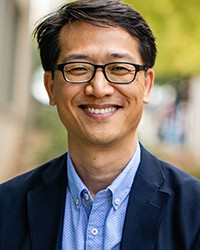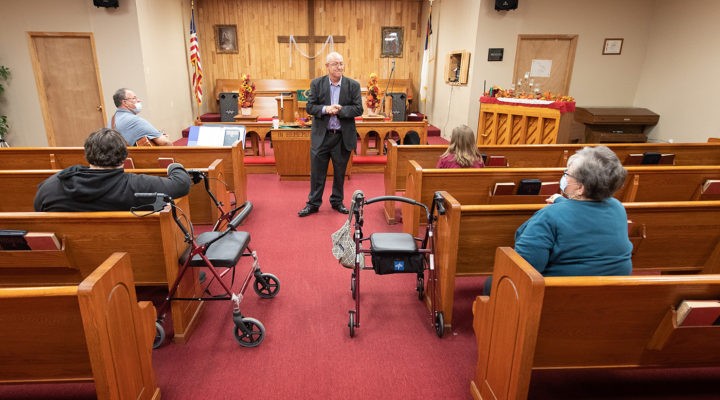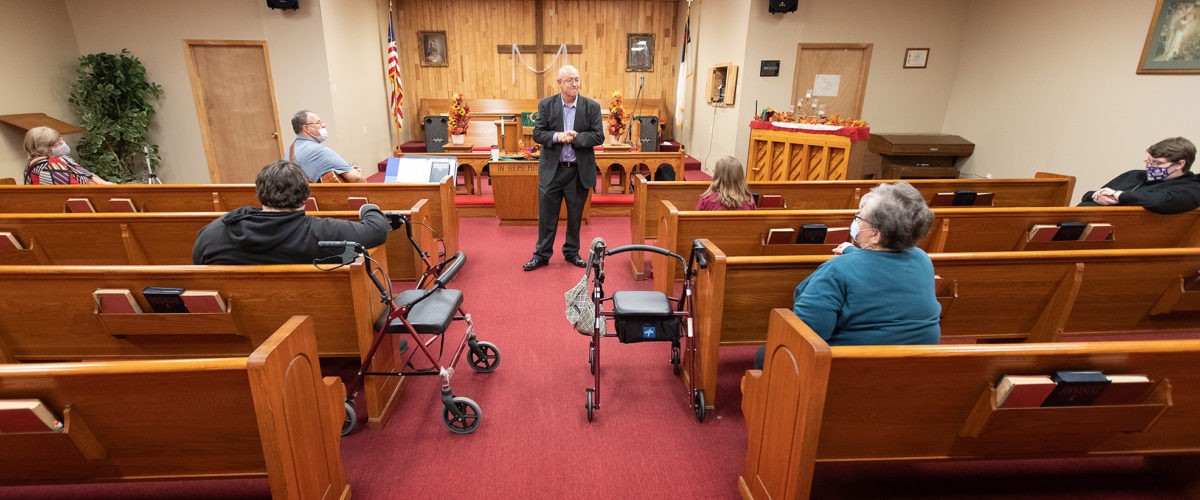The United Methodist Church staggers toward a twice-delayed global legislative conclave that appears likely to split the 12-million-member denomination. The options available to concerned United Methodists are multiplying at the highest levels, but church life differs greatly at the grassroots where congregations struggle with uncertain ministries in the wake of the earth-shaking changes wrought by the global coronavirus pandemic.
Church pundits are taking stock of the situation, but decision-makers are slow to respond.

Jane Ellen Nickell
Commentator Jane Ellen Nickell writes: “Any momentum coming out of the 2019 (General Conference) has stalled, and many in the church are further disheartened by the deaths of two prominent bridge-builders — Bishop John Yambasu of the Sierra Leone Conference, who was killed in a car accident in August, and Junius Dotson, head of the UMC General Board of Discipleship, whose death from pancreatic cancer was announced the same day as GC’s second postponement.”

David W. Scott
David W. Scott, mission theologian at the General Board of Global Ministries, has taken a deep dive into UMC politics. He cites four new issues before the church: gay marriage and ordination, denominational separation, regionalization, and denominational institutions. Scott also identifies eight new parties forming around these issues: traditionalists, exiting liberationists, progressives and remaining liberationists, institutionalists, regionalists and localists.
Reconciling Ministries Network offers an example of the “progressives and remaining liberationists” faction in its response to the second postponement of General Conference: “And, what continues to be clear and requires no waiting is our calling to be fully engaged in ministries that prepare the way for a Christ-centered, just and equitable future UMC at a more local level. This work is so important, and the Reconciling fruit it bears in our local churches, communities, and annual conferences is inspirational!”

Jae Hyoung Choi
Jae Hyoung Choi, Korean missionary in residence with the General Board of Global Ministries, comes closest to the reality facing local congregations. He writes: “The coronavirus has exposed the bare face of the world system that is tainted with structural injustices and exploitations. … This dangerous virus has magnified an intersectionality of the pandemic with the other social problems, like poverty, racism and climate injustices.”
Choi advocates that the UMC adopt a stance of “jubilee,” the Jewish concept of a restorative practice prescribed every 50 years in which debts are forgiven, slaves are freed and social injustices are addressed. He writes: “The pandemic has been a time for the church to examine its mission. All Christians want the post-pandemic church mission to be a renewed pilgrimage towards Jesus’ mission of giving the world life and giving it to the full.”
“Jubilee” is a concept that few congregations can grasp at the moment. A year into the worldwide pandemic, local churches are facing:
- Loss of constituents from in-person gatherings at the same time that virtual connections via the internet have increased significantly.
- Increased costs caused by the addition of virtual services requiring equipment, staff and technical expertise against an income decline caused by membership losses.
- Continued expenses for the upkeep of often-aging buildings that stand unused.
- Uncertainty over how to choose and design ministries for needs and in settings created by the pandemic.
- Staff and volunteer burnout from pandemic stress.
- Church members’ changed ministry needs caused by experiencing the pandemic, particularly unresolved grief at loved ones’ deaths from COVID-19 without the benefit that communal mourning such as in-person funerals affords.
None of the legislative proposals around the UMC’s divisive theo-political conflict addresses these on-the-ground realities. Part of this lack stems from the fact that the deadline for General Conference petitions passed in late 2019, long before the coronavirus pandemic was identified. General Conference organizers have exacerbated this gap by refusing to re-open the petition process for new proposals despite two postponements.
In essence, the vast majority of United Methodists have moved on to a new pragmatic reality of “doing church” based on pandemic experience while the UMC’s topmost leaders — especially the most distant poles of its political spectrum — have remained mired in the concerns of a bygone era.
“The vast majority of United Methodists have moved on to a new pragmatic reality of ‘doing church’ based on pandemic experience while the UMC’s topmost leaders … have remained mired in the concerns of a bygone era.”
Progressives and liberationists persist in seeing the church through a singular lens of its stances on human sexuality, while nearly three-fourths of U.S. congregations made their peace with LGBTQ rights and presence even before the pandemic began. Traditionalists persist in seeing the United Methodist conflict as one of preserving historic church authority, ignoring the fact that both theology and morality are being shaped by forces beyond the church’s control.
The next possible turning point for The United Methodist Church comes May 8, when a one-day special General Conference called by the Council of Bishops will convene. At the moment, the bishops have proposed a trim agenda of 12 items aimed at loosening the UMC’s administrative restrictions to allow it to function until a full General Conference can meet to decide the denomination’s fate.
However, it’s the General Conference, not the Council of Bishops, that sets the agenda for its meeting. Already traditionalists are pressuring General Conference organizers to take up legislation that would enact the Protocol of Reconciliation & Grace Through Separation, an independently negotiated agreement that would allow traditionalists to form their own denomination with $25 million in seed money from the existing UMC. Traditionalists recently announced the proposed formation of a new Global Methodist Church founded on strict theological and moral principles, including exclusion of LGBTQ people.
Proponents of other measures, such as the Christmas Covenant advocating unity through regionalization, and a “new vision” for the UMC outlined by another group called Out of Chaos, Creation, have expressed dismay at the effort to give precedence to the Protocol. The latest reaction to the traditionalists’ campaign, called The Alaska Omnibus Proposal, ties together all petitions submitted thus far on the church’s future, including recommendations from the UMC’s pensions agency on clergy retirements and on regionalizing governance from its ministry coordinating council.
“These efforts at inclusion and efficiency fail to address the most fundamental concept of human systems design: form follows function.”
Yet even these efforts at inclusion and efficiency fail to address the most fundamental concept of human systems design: form follows function. If the United Methodist branch of Christ’s church hopes to remain effective in the 21st century, it must jettison its partisan battles of the past and deal with the world as it is, namely the changes that the coronavirus pandemic has wrought in how the church functions in society.
In a 2008 book, the late religion expert Phyllis Tickle called our era “the Great Emergence,” reflecting historic 500-year cycles when new forms of Christianity came into existence through gradual evolution. Instead, the coronavirus pandemic has caused the Great Upheaval, a time of shock that instantly transformed human interaction into new patterns before corresponding social systems could be established. Perhaps, as commentator Jeremy Smith has noted, The United Methodist Church would do better to remake itself according to the adaptations being used by its local congregations than by attempting to reform or establish new institutions based on models from bygone eras.
Cynthia B. Astle is a veteran journalist who has covered the worldwide United Methodist Church at all levels for more than 30 years. She serves as editor of United Methodist Insight, an online journal she founded in 2011.
Related articles:
United Methodists learning more about Christmas Covenant through videos
New denomination declares ‘liberation’ from United Methodist Church
2020’s earth-shattering events threaten United Methodist Church’s future
United Methodists seek both separation and unity because of ‘Catholic Spirit’
Coronavirus challenging denominational summer conventions yet again


